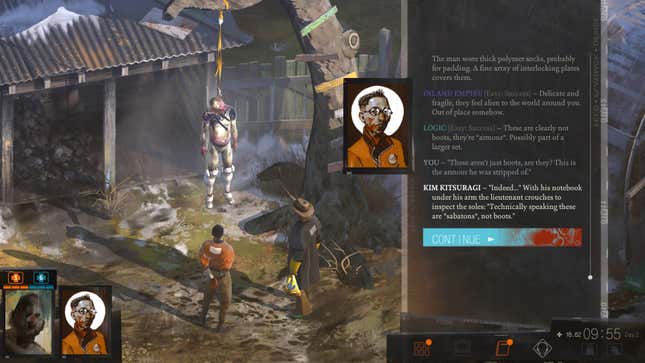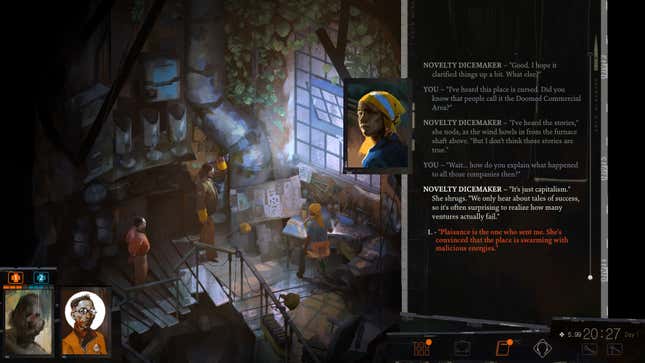
The other day, I tried to recommend Disco Elysium to Kotaku traitor and noted single-player game hater Cecilia D’Anastasio. Spinning an ode to the game’s masterful mixture of character writing and subtle world-building would, I knew, accomplish nothing. Instead, I decided to appeal directly to my target demographic, who tends to prefer competitive multiplayer games like Overwatch. “Talking to other characters feels good,” I said. “I’m addicted to it. It’s like pulling the trigger in a first-person shooter.”
I meant it, too. Every time I play Disco Elysium, I find myself absorbed, clicking and reading like some kind of insatiable word junkie. When work, life, or sleep pull me away, I feel a craving to resume, the phantom itch of a limb that only unfurls itself from my body when I’m visiting far-off virtual lands.
A couple days later, everything clicked into place for me when, in an interview with GameSpot, Disco Elysium lead writer Robert Kurvitz said that the development team considered Twitter its main competition in terms of hooking people with text. “We wanted to build a dialogue engine that’s as addictive and as snappy as Twitter,” Kurvitz said. He went on to explain that, in Disco Elysium, text flows upward, just like on Twitter, and it’s positioned in a similarly shaped column. Active text (the stuff you’re clicking on) winds up in the lower right portion of the screen, which is where people spend most of their time looking IRL, due to the fact that their right hand typically occupies that space in their field of vision.
But I don’t think that fully describes all of what Disco Elysium is doing under the hood. Most obviously, each dialogue option you click on begets a punchy, Twitter-length response. Text rarely overwhelms or intimidates. Rather, it beckons. It draws on the same “just five more minutes” or “just one more click” impulse that shooters and action games have learned to target with meticulous precision.
Clicks are often rewarded with sound effects that are almost tactile, crunchy noises not unlike what people seek out in YouTube compilation videos: book pages brushing against each other, a film reel whirring, a light bulb bursting. There’s consistency to this sonic language. The light bulb bursts when you fail a check against your stats. A spooky bell-like noise drones every time one of the 24 different facets of your personality, each of which have their own stats, pipes up during a conversation. The game trains you to expect these things with visual effects that precede them. It makes you crave them.
On top of that, there are stat checks for activities like convincing someone to open up to you or trying to get out of debt (by physically diving away from the person who’s asking you to pay up), and you can often retry them later. That in mind, it’s usually worthwhile to at least try a check, even when your chances aren’t great. Checks, too, are accompanied by a tension-building rush of sights and sounds. It’s like pulling the lever on a slot machine, except that failure is sometimes the most desirable outcome, because the resulting scenarios—which involve your detective mumbling, stumbling, or Matrix-diving through some of the most awkward situations imaginable—are among the funniest I’ve ever encountered in a game. Whether you’re succeeding or failing, Disco Elysium spurs you on with subtle sights and sounds. The game’s “electrochemistry” stat, eternally tempting your character to give in to the shortsighted whims of his flesh, has nothing on the game itself.
The most eye-opening thing Kurvitz pointed out in the GameSpot interview concerned the content of Disco Elysium’s text. Once again mirroring social media, dialogue is frequently, in Kurvitz’s words, “confrontational.” People call you “pig” and things like that, so as to yank you back in when you might be drifting away. He said that the development team’s goal was not to replicate social media’s “nasty psychological environment” in its entirety, but to draw on what makes it so difficult to look away from. Kurvitz arrived at the conclusion that the most compelling dialogue is “personal.”
I’ve found that the whole game is structured around this idea, and that’s thanks in large part to the fact that you’re always in conversation with your own personality. As a result, any conversation can take an unexpected turn for the personal. You might be interrogating a suspect in the case you’re working to solve, trying to pry answers from the defiant grip of a foul-mouthed child, or listening to someone exposit at length about the region’s history, but suddenly, the “continue” button turns a sickly shade of purple, a vomit-encrusted yellow, or a number of other ugly hues, and you know what’s coming: One of your personality facets has an Opinion. These little asides are yours and yours alone. They’re a line in to a network of gossip, like when someone says they’re about to spill some tea on their private Twitter account. You want to know what they’re going to say. You see that button change color, and you need to know.

“Empathy” might let you know that somebody really means what they’re saying, that they’re not trying to take a swipe at you, even if that’s how it sounds. “Inland Empire” might beckon you to open a door you know you shouldn’t with tantalizing visions of what could be behind it. “Drama” will almost always compel you to be a messy bitch, because people frequently reveal their truest selves when they’re caught off guard. In any case, these whispers in your head reveal gossipy truths about both the characters you’re interacting with and you. They give you context and, as Kurvitz notes, reiterate the stakes, making the game world’s complex goings-on easier to connect with on an emotional level.
In short, they make it about you. And no matter how interesting everybody around a person is, people are always going to be most interested in themselves. This is especially true in Disco Elysium, given that your character is a drug and booze-addled amnesiac. As a result, you never know when a conversation might reveal new information about your character, the ghastly husk of a cop who wandered this town for days before the game began. And so, to put it back in social media terms, in Disco Elysium, you’re not just reading other people’s statuses; you’re also composing your own profile, one conversation at a time.